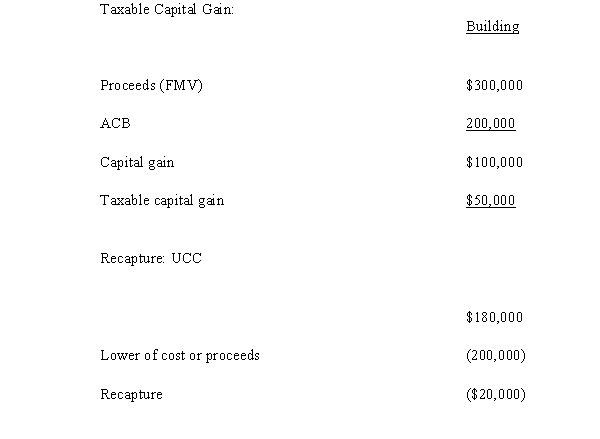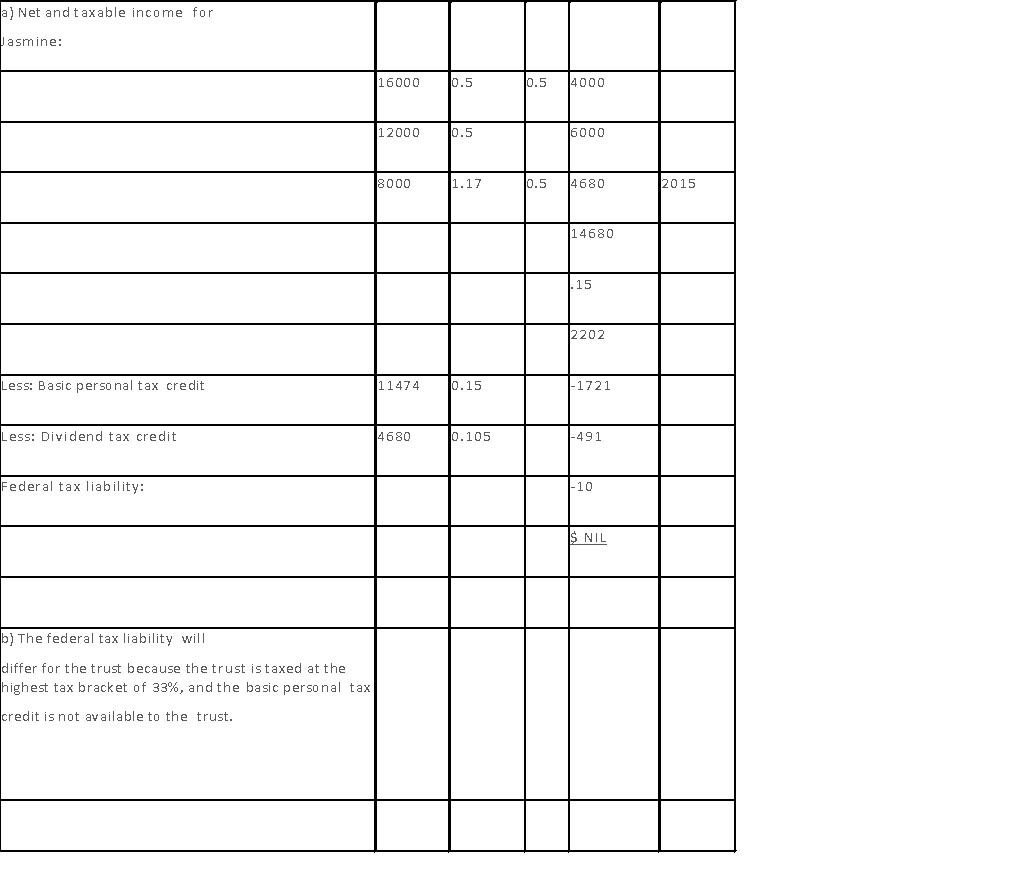Deck 17: Trusts
Question
Question
Question
Question
Question
Question
Question
Question

Unlock Deck
Sign up to unlock the cards in this deck!
Unlock Deck
Unlock Deck
1/8
Play
Full screen (f)
Deck 17: Trusts
1
Walter passed away this year at the age of 62.
Previously, Walter had structured his will so that his wife would receive $80,000 in cash, and she would also receive his stocks and land to be held in a trust on he behalf. Additionally, Walter's 33 year old son, Steven, would receive a building t be held in a trust until Steven reached the age of 45.
The assets transferred to Walter's wife consist of a piece of land with an ACB of
$100,000 and a FMV of $300,000; and stocks valued at $200,000, with a cost base of $150,000.
The assets transferred to Steven consist of a building with an ACB of $200,000, UCC of $180,000, and a FMV of $300,000.
Required:
What are the tax consequences that will be recognized on Walter's tax return? Show all calculations.
What are the tax consequences for the assets transferred to Walter's wife?
What are the immediate tax consequences from the asset transfers to Walter's son Steven?
Previously, Walter had structured his will so that his wife would receive $80,000 in cash, and she would also receive his stocks and land to be held in a trust on he behalf. Additionally, Walter's 33 year old son, Steven, would receive a building t be held in a trust until Steven reached the age of 45.
The assets transferred to Walter's wife consist of a piece of land with an ACB of
$100,000 and a FMV of $300,000; and stocks valued at $200,000, with a cost base of $150,000.
The assets transferred to Steven consist of a building with an ACB of $200,000, UCC of $180,000, and a FMV of $300,000.
Required:
What are the tax consequences that will be recognized on Walter's tax return? Show all calculations.
What are the tax consequences for the assets transferred to Walter's wife?
What are the immediate tax consequences from the asset transfers to Walter's son Steven?
a) Walter:
Walter's estate will have a taxable capital gain of $50,000 and recapture of
$20,000 upon the disposal of the building bequeathed to Steven. Building transferred to Steven's testamentary trust:
 a) Walter's wife:
a) Walter's wife:
There will be no tax consequence on the $80,000 cash received by Walter's wife.
The other assets will be transferred to a testamentary spousal trust at their tax values, and therefore, there will not be any immediate tax effects.
b) Steven:
The building will be transferred to a testamentary trust at its FMV. The taxable capital gain and recapture realized on the transfer are taxed in Walter's estate.
Walter's estate will have a taxable capital gain of $50,000 and recapture of
$20,000 upon the disposal of the building bequeathed to Steven. Building transferred to Steven's testamentary trust:
 a) Walter's wife:
a) Walter's wife:There will be no tax consequence on the $80,000 cash received by Walter's wife.
The other assets will be transferred to a testamentary spousal trust at their tax values, and therefore, there will not be any immediate tax effects.
b) Steven:
The building will be transferred to a testamentary trust at its FMV. The taxable capital gain and recapture realized on the transfer are taxed in Walter's estate.
2
Jasmine is the beneficiary of an inter vivos trust. During 20X4, the trust received the following income:
Capital gains: $16,000 Interest: $12,000
Non-eligible dividends: $8,000
One half of the trust's income from 20X4 was paid to Jasmine, who does not
currently have any other sources of income. The remainder of the income stayed in the trust.
Required:
a) Determine Jasmine's personal federal tax payable. (Rounded to zero decimal places)
b) Explain how the federal tax liability will differ for the trust. Calculate the federal tax liability for the trust.
Capital gains: $16,000 Interest: $12,000
Non-eligible dividends: $8,000
One half of the trust's income from 20X4 was paid to Jasmine, who does not
currently have any other sources of income. The remainder of the income stayed in the trust.
Required:
a) Determine Jasmine's personal federal tax payable. (Rounded to zero decimal places)
b) Explain how the federal tax liability will differ for the trust. Calculate the federal tax liability for the trust.

3
If a trust qualifies as a spousal trust, which of the following is FALSE?
A) In many situations, the assets in the trust remain tax-free until the death of the surviving spouse due to the waiver of the 21-year rule at the first 21-year anniversary.
B) Property is deemed to have been sold at its cost amount when transferred to the trust.
C) Both the spouse and any adult children can receive the capital of the trust prior to the settlor's death.
D) Upon the death of the surviving spouse, the trust property is deemed to be sold at market value.
A) In many situations, the assets in the trust remain tax-free until the death of the surviving spouse due to the waiver of the 21-year rule at the first 21-year anniversary.
B) Property is deemed to have been sold at its cost amount when transferred to the trust.
C) Both the spouse and any adult children can receive the capital of the trust prior to the settlor's death.
D) Upon the death of the surviving spouse, the trust property is deemed to be sold at market value.
C
4
Your friend Andrew has heard that you are studying Canadian income taxation. He has heard people discussing something called the '21 Year Rule' with regard t trusts. He has come to you with questions regarding this rule, since his father
recently established inter vivos trusts for both Andrew and his mother.
Required:
Briefly answer the following questions:
With regard to non-spousal trusts:
1) What is the purpose of the "21 Year Rule"?
2) What event occurs on the 21st anniversary of a trust?
3) What types of properties are subject to the 21 Year Rule?
4) How can the consequences of the 21 Year Rule be avoided?
With regard to spousal trusts:
5) What is the exception to the 21 Year Rule for spousal trusts?
recently established inter vivos trusts for both Andrew and his mother.
Required:
Briefly answer the following questions:
With regard to non-spousal trusts:
1) What is the purpose of the "21 Year Rule"?
2) What event occurs on the 21st anniversary of a trust?
3) What types of properties are subject to the 21 Year Rule?
4) How can the consequences of the 21 Year Rule be avoided?
With regard to spousal trusts:
5) What is the exception to the 21 Year Rule for spousal trusts?

Unlock Deck
Unlock for access to all 8 flashcards in this deck.
Unlock Deck
k this deck
5
A trust that is created upon the death of an individual, and which is taxed applying the full range of tax rates within the individual's progressive scale is a(n):
A) Inter vivos trust
A) Unit investment trust
B) Graduated rate estate trust
D) Investment trust
A) Inter vivos trust
A) Unit investment trust
B) Graduated rate estate trust
D) Investment trust

Unlock Deck
Unlock for access to all 8 flashcards in this deck.
Unlock Deck
k this deck
6
Which of the following statements accurately describes the rules pertaining to qualified graduated rate estate trusts?
A) Trusts that qualify as graduated rate estate trusts may use a non-calendar tax year, and they are subject to the highest federal personal tax rate.
B) Trusts that qualify as graduated rate estate trusts may use a non-calendar tax year, and they may apply the full range of rates from the personal graduated tax rate scale.
C) Trusts that qualify as graduated rate estate trusts must use the calendar year as their taxation year, and they may apply the full range of rates from the personal graduated tax rate scale.
D) Trusts that qualify as graduated rate estate trusts must use the calendar year as their taxation year, and they are subject to the highest federal personal tax rate.
A) Trusts that qualify as graduated rate estate trusts may use a non-calendar tax year, and they are subject to the highest federal personal tax rate.
B) Trusts that qualify as graduated rate estate trusts may use a non-calendar tax year, and they may apply the full range of rates from the personal graduated tax rate scale.
C) Trusts that qualify as graduated rate estate trusts must use the calendar year as their taxation year, and they may apply the full range of rates from the personal graduated tax rate scale.
D) Trusts that qualify as graduated rate estate trusts must use the calendar year as their taxation year, and they are subject to the highest federal personal tax rate.

Unlock Deck
Unlock for access to all 8 flashcards in this deck.
Unlock Deck
k this deck
7
A trust account holds two buildings as its assets. Building 1 originally cost $150,000 and Building 2 originally cost $210,000. It is now the 21st anniversary of the trust, and the assets have not been transferred to the beneficiary. The undepreciated capital cost of Building 1 is $85,000 and its market value is $200,000. The undepreciated capital cost of Building 2 is $145,000 and its market value is $190,000. Which costs will be the
Deemed acquisition values of the buildings for the trust?
A) B1 = $150,000; B2 = $210,000
B) B1 = $200,000; B2 = $190,000
C) B1 = $85,000; B2 = $145,000
D) B1 = $200,000; B2 = $210,000
Deemed acquisition values of the buildings for the trust?
A) B1 = $150,000; B2 = $210,000
B) B1 = $200,000; B2 = $190,000
C) B1 = $85,000; B2 = $145,000
D) B1 = $200,000; B2 = $210,000

Unlock Deck
Unlock for access to all 8 flashcards in this deck.
Unlock Deck
k this deck
8
Which of the following statements is TRUE regarding trusts?
A) The residence of a trust is determined by the residence of the trustees.
B) Losses that exceed income in a trust are allocated to the beneficiary for tax purposes.
C) Mutual funds are one example of commercial trusts.
D) Income that is payable to a beneficiary cannot be subtracted from the trust's income.
A) The residence of a trust is determined by the residence of the trustees.
B) Losses that exceed income in a trust are allocated to the beneficiary for tax purposes.
C) Mutual funds are one example of commercial trusts.
D) Income that is payable to a beneficiary cannot be subtracted from the trust's income.

Unlock Deck
Unlock for access to all 8 flashcards in this deck.
Unlock Deck
k this deck



